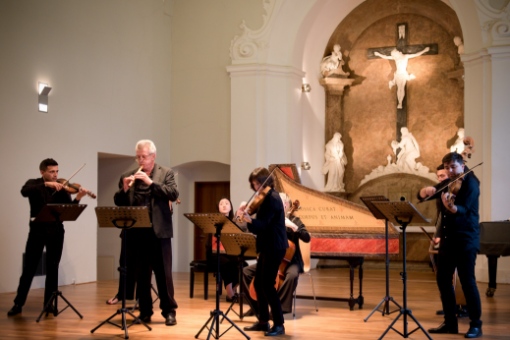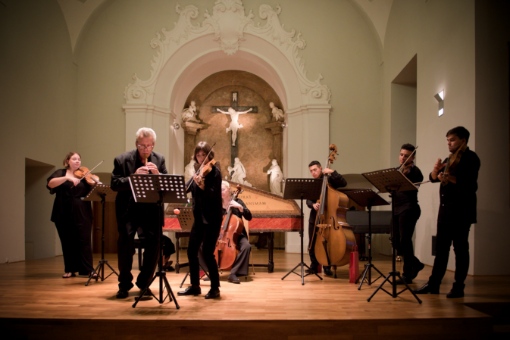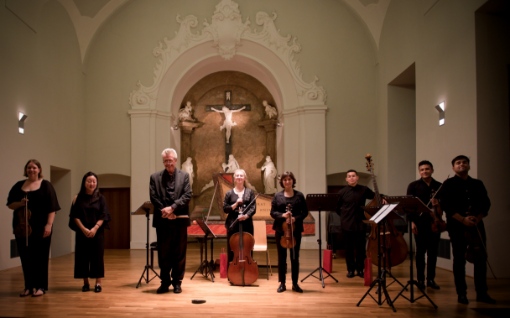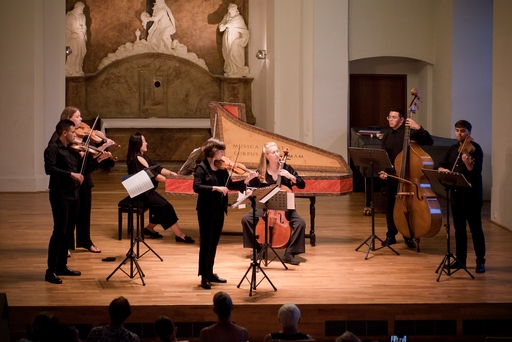The international group Ensemble Fantasmi, which focuses on older music and was founded by flautist Paul Leenhouts, performed in Olomouc, at the Znojmo Music Festival and also visited Brno during a small European tour. The group presented themselves to the audience on Monday 24 July at Červeny kostel, where they, along with the invited singers prepared vocal-instrumental works by Czech Baroque composers. The reviewed concert in the Hall of Merciful Brothers on 25 July, which was also the last night of the tour, was in the same spirit. Its subheading Musica Bohemica pointed to a varied programme consisting of instrumental works by Czech composers of the Baroque and Classical periods.
The concert opened with a peculiar work, Sonata Jucunda, which was described in the brochure as anonymous, but is often attributed to the composer Heinrich Ignaz Franz von Biber. The piece featured Paul Leenhouts as soloist. With a thrilling expression based on precise technique and articulation, he brought a touch of extravagance to the hall, which was most prominent in the fantasy movements. The audience also noticed a certain relaxation in the tempo with which the ensemble played. In spite of the original agogics, the staging was compact, cohesive and balanced in terms of sound.

Cellist Sydney ZumMallen impressed with the ease and insight with which she played the Concerto in D minor by Jan Antonín Reichenauer. Although the accompaniment of the basso continuo was very sensitive and the musicians responded promptly to the soloist, at times - especially in the lower positions - the sound of the cello was slightly lost. But these moments were balanced by the singing in the second movement, which at times resembled a dialogue (duets) between the violins, cello and viola.
In the virtuoso concert, the audience was also introduced to a trio of violinists who are members of Ensemble Fantasmi and who were given the same opportunity. And so they presented themselves from the position of an accompanying player, primo and also soloist. Violinist Karim Ayal Poole's setting of Joseph Umstatt's Concerto in F major was again characterised by ingenious agogic work and elaborately constructed phrases. Poole played with the fluidity of the musical flow (timing) while completing each idea. He especially took his time at the endings, thus giving the composition a certain drive and achieving the desired effect. We had the opportunity to see a similarly varied interpretation in František Jiránek's work, where the solo part was taken by the ensemble's artistic director and flautist Paul Leenhouts.

The second half of the evening began with the South Korean harpsichordist Jiyoung Kim, who performed the third movement (Allegro) from the Concerto in B minor by Jiří Antonín Benda. Balanced, exact, precise: that's how her performance could be described. The challenging technical matters and long passages of figurations such as Alberti's basses, played with insight and complete calmness by Jiyoung Kim, seemed too mechanical at times.
Two movements from Josef Antonín Gurecký's Concerto in D major were performed by violinist Polly Klein. The cantabile Grave, brimming with sequences, was replaced by Vivace, in which the violin part abounded in ornamentation. The last movement was not in a very fast tempo, but the virtuosity of the soloist stood out all the more. The lively and vibrant character of the movement culminated in the slowly graduating finale. The exhibition over a long delay was highly effective, during which the violin part thickened melodically and rhythmically. Polly Klein's staging, like Karim Poole's, was energetic and powerful.

The last work on the programme was Antonín Jiránek's Concerto in D major for violin, viola and flute. And so the last of the three violinists who also appeared as a soloist was Annie Barnette, being joined by RJ McDowell (viola) and Paul Leenhouts. The communication between the players was particularly interesting - the piece is based on dialogue and imitation, and Leenhouts conducted the orchestra during his playing. RJ McDowell also offered a distinctive musical display, and the variety and sound of his viola did not waver in the basso continuo. Perhaps the euphoria and enthusiasm with which the ensemble played the piece caused some inconsistencies in the harmony at the very end of the third movement. These, however, may be considered irrelevant in relation to the performance as a whole.
The ensemble does not demonstrate its professional approach and knowledge of historically informed interpretations only through its playing. As many may have noticed from the programme brochure, Ensemble Fantasmi aims, among other things, to bring to the surface previously unperformed or unrevised compositions that Leenhouts himself is transcribing into modern notation. The audience reacted to the powerful musical experience with thunderous applause and ovations, which earned them an encore in the form of an arrangement of a Romanian folk song (arr. Polly Klein).
Program:
Anonymous, attributed to Heinrich Ignaz Franz von Biber - Sonata Jucunda
Jan Antonín Reichenauer - Concerto in D minor
Joseph Umstatt - Concerto in F major
František Jiránek - Concerto in B flat major
Jiří Antonín Benda - Concerto in B minor (3rd movement)
Josef Antonín Gurecký - Concerto in D major (2nd and 3rd movements)
Antonín Jiránek - Concerto in D major
Cast:
Ensemble Fantasmi
Paul Leenhouts - recorder, artistic director
Karim Ayala Pool - violin
Annie Barnette - violin
Polly Klein - violin
RJ McDowell - viola
Sydney ZumMallen - cello
Josue Reyes - double-bass
Jiyoung Kim - harpsichord
Tuesday 26. 7. 2023, Hall of Merciful Brothers
































No comment added yet..